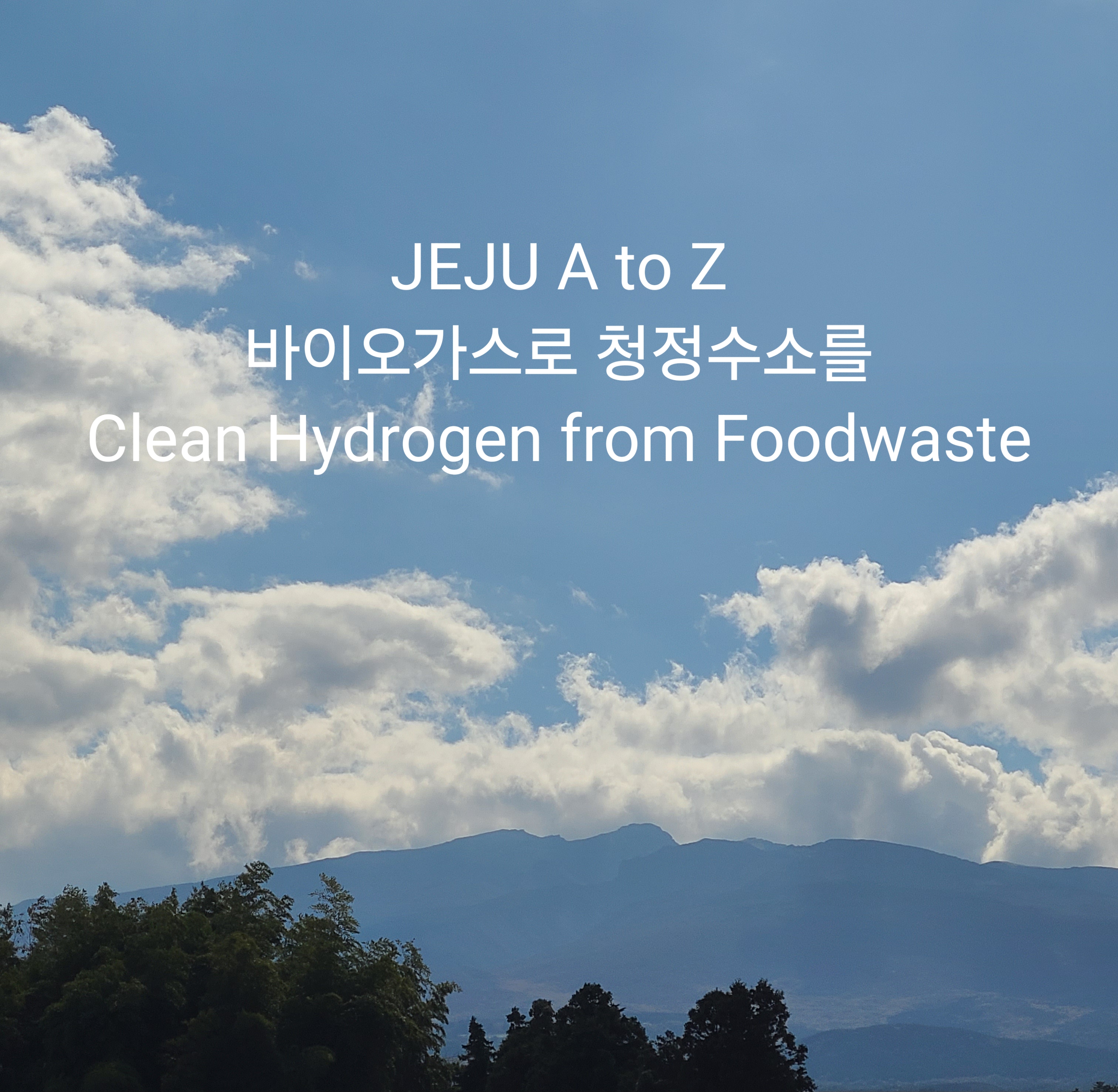바이오가스로 수소를
JEJU A to Z
바이오가스로 청정수소를
Clean Hydrogen from Foodwaste

Z: 제주의 신재생에너지는 풍력과 태양열이 주 에너지원이지만, 바이오가스도 중요한 자원 중 하나이다.
Although wind and solar power are the main sources of renewable energy in Jeju, biogas is also one of the important resources.
A: 바이오가스는 음식물쓰레기에서 나오는 에너지를 활용하는 것으로 알고 있다.
As far as I know, biogas uses energy from food waste.
Z: 그렇다. 제주도청은 버려지는 음식물 쓰레기를 활용한 친환경에너지 생산에도 힘쓰고 있다.
Yes, the Jeju Provincial Government is also working on producing eco-friendly energy by using discarded food waste.
A: 음식물쓰레기로 친환경 에너지를 생산하면 탄소중립도시에 일조할 것이다.
Producing eco-friendly energy from food waste will contribute to a carbon-neutral city.
Z: 제주도청은 버려지는 음식물 쓰레기에서 하루 500kg의 청정수소를 생산하는 친환경 에너지 사업을 추진한다.
환경부가 주관하는 ‘2025년 바이오가스 기반 청정수소 생산사업’ 공모가 있었다.
The Jeju Provincial Government promotes an eco-friendly energy project that produces 500 kilograms of clean hydrogen a day from discarded food waste.
There was a contest for the "2025 Biogas-based Clean Hydrogen Production Project" organized by the Ministry of Environment.
A: 제주가 선정된 것인가요? 대한민국정부로부터 예산을 받을 수 있겠네요.
Was Jeju chosen? I guess I can get a budget from the Korean government.
Z: 제주가 환경부로부터 국비 91억원을 확보했다.
한마디로 바이오가스로 청정수소를 생산하는 사업에 투입되는 예산을 확보한 것이다.
이 사업은 음식물류 폐기물과 가축분뇨 등의 유기성 폐자원에서 발생하는 바이오가스를 정제해서 청정수소를 생산하는 사업이다.
Jeju has secured 9.1 billion won in state funds from the Ministry of Environment.
In short, it has secured a budget for the business of producing clean hydrogen from biogas.
This project produces clean hydrogen by refining biogas generated from organic waste resources such as food waste and livestock manure.
A: 제주는 광역 폐기물 자원화시설을 보유하고 있다. Jeju has a wide-area waste resource facility.
Z: 전국 최대규모인 광역 음식물류 폐기물 자원화시설을 갖고 있다.
즉 다시말해 제주도의 강점은 이와 관련한 데이터를 보유한 것이다.
2024년 6월부터 이 시설을 운영하면서 시설 운영 데이터와 바이오가스 발생량을 분석해왔다.
Z: It has the largest regional food waste resource facility in the country.
In other words, the strength of Jeju Island is that it has data related to this. Since June 2024, the facility has been operating, analyzing facility operation data and biogas generation.
A: 하루 처리용량은 얼마나 되나요? How much is the daily processing capacity?
Z: 340톤이다. 이를 처리하면서 쌓아온 데이터를 토대로 사업성 검토를 해왔다.
It's 340 tons. Based on the data accumulated while processing this, the business feasibility review has been conducted.
A: 환경부 사업 공모를 위해서 철저하게 준비해왔군요.
그러니까 사업 대상자로 선정된 것이겠죠.
Jeju has prepared thoroughly for the Ministry of Environment's business contest.
That's why they were selected as the target of the project.
Z: 제주도청은 환경부, 한국환경공단과의 협약체결을 바탕으로 사업을 추진하게 된다.
The Jeju Provincial Government will push ahead with the project based on the agreement signed with the Ministry of Environment and the Korea Environment Corporation.
A: 확보되는 예산은 얼마인가요? How much is the secured budget?
Z: 총사업비는 130억원이다. 국비는 91억원이고 도비는 39억원이다.
The total project cost is 13 billion won.
The national budget is 9.1 billion won and the provincial budget is 3.9 billion won.
A: 청정수소 생산설비가 들어와야 하는 사업이다. 어디에 짓게 되는 거죠?
It's a business that requires clean hydrogen production facilities. Where will it be built?
Z: 서귀포시 색달동 광역음식물류 폐기물 자원화시설 인접부지에 청정수소 생산시설을 구축할 예정이다.
The clean hydrogen production facility will be built on the site adjacent to the metropolitan food waste resource facility in Saekdal-dong, Seogwipo-si.
A: 그럼 언제 완공해서 바이오가스로 청정수소를 생산하게 될까요?
Then when will it be completed to produce clean hydrogen from biogas?
Z: 2026년말 완공을 목표로 한다.
이 시설은 현재 58% 수준의 가동률을 보이고 있다.
이 음식물류 폐기물 자원화시설 가동률을 기반으로 운영에 필요한 전력과 열원을 제외하고서 남는 바이오가스를 정제해서 하루 500kg의 청정수소를 생산하게 된다.
It aims to be completed by the end of 2026. The facility currently has a 58 percent utilization rate.
Based on the utilization rate of this food waste resource facility, 500 kilograms of clean hydrogen will be produced per day by refining the remaining biogas, excluding the power and heat source required for operation.
A: 제주는 그린수소 생산을 최초로 성공한 곳이다.
앞으로 청정수소를 필요로 하는 곳은 많아질 것이다.
Jeju is the first place to succeed in producing green hydrogen.
In the future, there will be more places that need clean hydrogen.
Z: 제주도는 음식물류 폐기물 반입량과 수소수요 증가에 따라서 단계적으로 청정수소 생산량을 하루 최대 2500kg까지 확대해 나갈 계획이다.
Jeju plans to gradually increase its clean hydrogen production to up to 2,500 kilograms per day in accordance with the increase in food waste and hydrogen demand.
A: 음식물쓰레기에서 에너지를 생산해 나간다면 제주가 추진하는 탄소중립도시에 한걸음 더 다가갈 것으로 기대된다.
If Jeju produces energy from food waste, it is expected to take a step closer to Jeju's carbon-neutral city.
Z: 청정수소 생산사업은 연간 1485톤의 온실가스 감축효과가 나타날 것으로 보인다.
지역의 에너지 자립에도 크게 기여할 것이다.
다각적인 효과가 기대된다.
The clean hydrogen production project is expected to reduce greenhouse gas emissions by 1485 tons per year.
It will also greatly contribute to regional energy independence.
Multilateral effects are expected.
A: 제주도 전역에 수소와 연계된 시설들이 구축되면서 수소인프라가 균형있게 조성되어 나가겠네요.
Hydrogen infrastructure will be balanced as hydrogen-related facilities are built throughout Jeju Island.